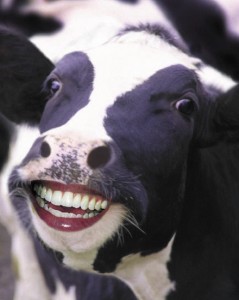Well, unless you’ve been in Outer Mongolia for the past month or you’re already too embroiled in the up-and-coming Olympics (go team GB!), you couldn’t have failed to notice that ethical food has been hitting the news headlines of late. The Internet, newspapers and our TV news bulletins are all buzzing with the milk controversy and concerns over imports of battery eggs and unethically reared pork.
While many of us say we want sustainably produced local food, how much of this is a true conviction, and how much is just lip service to gain a few more followers on Twitter? In fact, how many of us truly understand what ethical food really is?
Words like ethics, sustainable, traceability, Red Tractor and Freedom Foods readily trip off the tongue, but what do they actually mean?
Let’s start with the milk debacle; a subject close to my own heart, being a Devon lass, even though – I have to confess – I don’t even drink milk!
For those who have been in Outer Mongolia, I’ll bring you up to speed…
Dairy farmers have had the farm gate price of their milk cut by 2p a litre by the major producers, notably Robert Wiseman Dairies. The cost of milk production is around 30ppl (pence per litre), yet our farmers are being paid only 25ppl. You don’t have to be a mathematician to work it out. If your product costs more to produce than you can sell it for… it will be more than the milk going down the pan.
If you visit Robert Wiseman’s website, you’ll see they devote a “whole” page to ‘A Sustainable Wiseman’. I might be having a senior moment here – so please bear with me – but surely a ‘wise man’ wouldn’t force the producers of his product to the point that they have no option but to declare bankruptcy? It’s not sustainable and it’s certainly not ethical.
It wasn’t long before the supermarkets felt the force of the farmer’s wrath, however…
Backed up by an outraged hubbub on social networks, and named and shamed in the media, chains such as the Co-op (which awarded its own-brand milk contract to Robert Wiseman Dairies in March 2011) made something of a retreat, and – at least in the case of the Co-op – they raised their production payment to 29ppl (pence per litre).
Doesn’t it make you wonder why the Co-op (which calls itself the champion of ‘Fair Trade’) hadn’t already extended its championship to UK dairy farmers? A contradiction of terms, I believe, where a company’s mission, vision and values don’t reflect their true policies, procedures and practices.
So far, only Morrisons have offered a payment (of 31ppl) that will cover the farmers’ costs, yet for that ‘generous’ one single pence profit margin they gift to their suppliers, they make around 15ppl themselves.
But enough of the soap box for now… what do these foodie terms mean?
Lets start with Red Tractor. This quality assurance scheme was set up in 2000. When you see the distinctive logo, you know the food has been produced in the UK and its packaging, storage and transportation has met stringent standards. Red Tractor-labelled food has full traceability, so all the products can be traced back to their origins.
Freedom Foods is the RSPCA’s assurance scheme. This focuses on the animal welfare aspect of food production. The animals (fish included) must be reared to give them the best possible quality of life. This also includes providing a stimulating environment to meet their psychological needs. Freedom Foods actually go the furthest in ensuring good and kind animal husbandry for us omnis and carnis to vore.
So, is ethical food production a viable way of feeding the nation?
Yes, it is.
You only have to look at the increase in farm shops, farmer’s markets and the number of restaurants, pubs and hotels using local foods in their kitchens to understand this. There is a great public demand and these savvy businesses are managing the supply.
It’s not just those posh Michelin Star restaurants, which cater for the top end of the market, either. Many small catering enterprises and even retail outlets are taking their responsibilities seriously and seeing the wider benefits of using ethical foods.
We need to know how and where our food is produced. OK, not everyone wants to know they’re eating Percy the pig from Pontefract, but that same traceability helps maintain quality, reduces the spread of disease in the food chain, and gives the consumers a wider choice.
So, supporting local food initiatives makes sense.
Likewise, buying ethically produced food makes sense.
But the bottom line, here, is sustainability. Without sustainable practices, our whole future food security is at risk.
And finally, if you ever thought a student’s diet consisted only of baked beans and beer, think again! As you all know, I do a lot of work with students’ unions and I’m delighted to say, that the students’ unions are a major advocate of the ethical food movement, too. And that’s good news for all of us… because the future will soon be in their hands.

